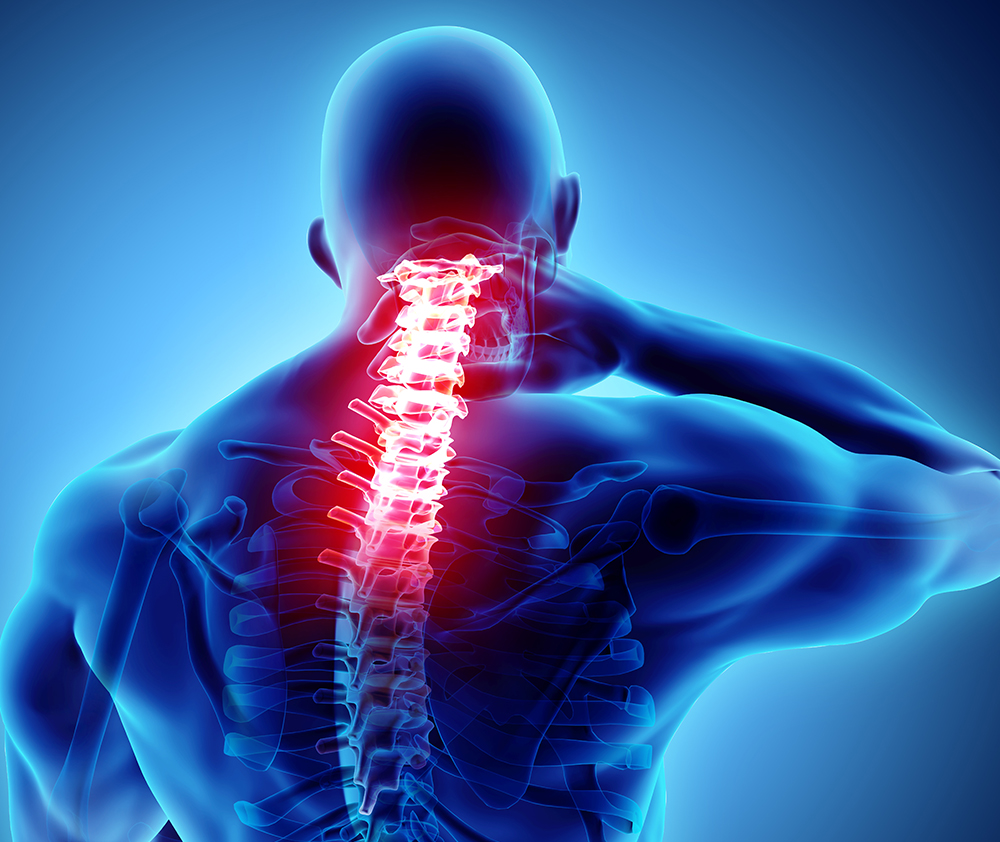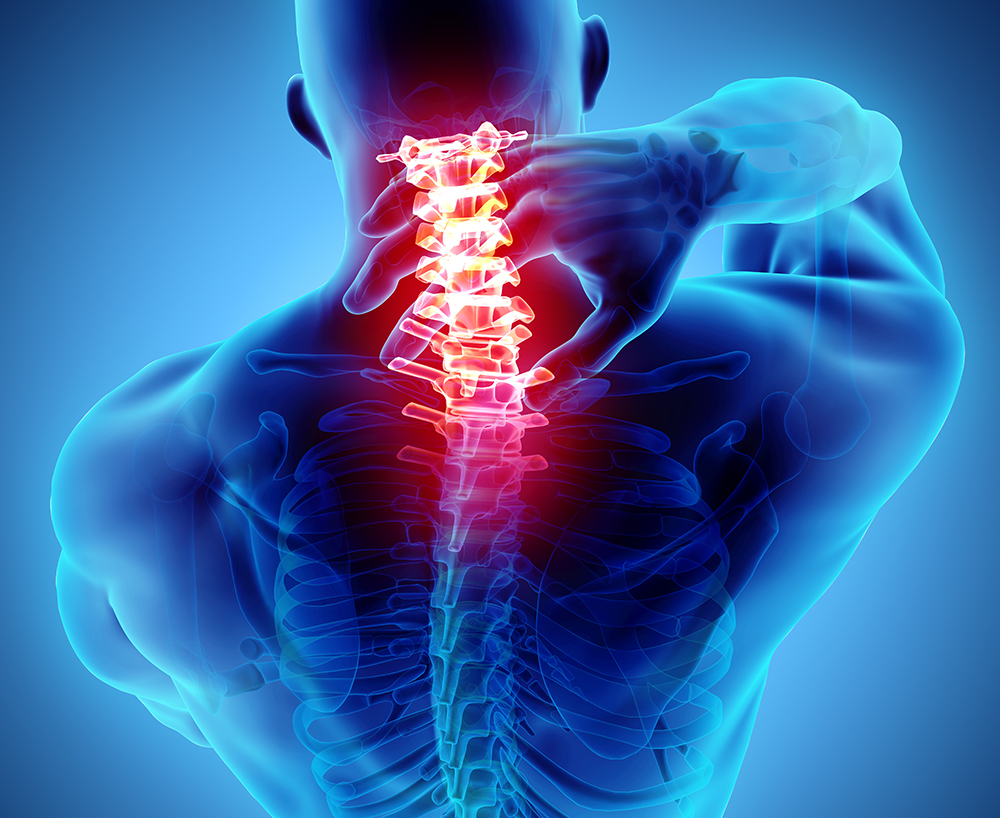Neck & Spine Pain
Neck and spine pain can be quite common and can range from mild discomfort to severe and debilitating pain. It is essential to understand that neck and spine pain can have various causes and may require different treatments based on the underlying condition.
Common Spine and Neck Pain Conditions
Muscle Strain:
Overuse, poor posture, or sudden movements can strain the muscles and ligaments in the neck and spine, leading to pain and discomfort.
Spondylolisthesis:
It happens when a vertebra slips out of its normal position and onto the vertebra below it. This can result in neck or back pain, muscle tightness, and nerve compression symptoms.
Cervical Spondylosis:
This refers to age-related changes in the neck joints, including the discs, vertebrae, and facet joints. It can lead to neck pain, stiffness, and reduced range of motion.
Whiplash:
Usually caused by a sudden back-and-forth movement of the neck, such as in a car accident, whiplash can lead to neck pain, stiffness, headaches, and other symptoms.
Herniated Disc:
Also known as a slipped or ruptured disc, this occurs when the soft, jelly-like center of a spinal disc pushes through a crack in the tough outer layer. It can cause localized pain and radiating pain, numbness, or tingling sensations in the neck, arms, or back.
Spinal Stenosis:
This condition occurs when the spaces within the spine narrow, compressing the spinal cord and nerves. It commonly affects the neck and can cause neck pain, weakness, numbness, or tingling in the arms or legs.
Degenerative Disc Disease:
This condition involves the gradual wear and tear of the spinal discs, leading to disc thinning, loss of cushioning, and potential bone-on-bone contact. It can result in neck pain and stiffness.
Osteoarthritis:
This degenerative joint disease can affect the joints in the neck, leading to neck pain, stiffness, and reduced mobility.
Neuromechanical Impulse treats over 85 conditions.
It's important to note the website provides just a few examples. There many are other conditions that effect the nerves, muscles, tendons, and joints from head to toe in addition to severe spine and neck pain. If you're experiencing persistent or acute pain, it's always recommended to consult with a Neuromechanical Impulse healthcare professional for an accurate diagnosis and appropriate treatment options.

Long-term Impact of Unresolve Neck/Spinal Issues.
It’s crucial to address spine conditions promptly by seeking medical evaluation and following the recommended treatment plan. This may involve physical therapy, medication, lifestyle modifications, or, in some cases, surgical intervention. Consulting with a healthcare professional is essential for an accurate diagnosis and appropriate management of spine conditions.
Not addressing spine conditions can have various effects on an individual’s health and well-being. Here are some potential consequences:
Pain and Discomfort:
Spine conditions, such as herniated discs, spinal stenosis, or scoliosis, can cause chronic pain and discomfort. Ignoring these conditions can lead to ongoing suffering and decreased quality of life.
Functional Limitations:
Spine conditions can limit a person’s ability to perform daily activities or engage in physical exercise. Without addressing these conditions, individuals may experience difficulties with mobility, flexibility, and overall physical function.
Reduced Quality of Life:
Chronic pain and functional limitations can significantly impact a person’s quality of life. Simple tasks, such as sitting, standing, or walking, may become challenging and uncomfortable. This can affect work productivity, social interactions, and overall mental well-being.
Progression of the Condition:
Some spine conditions have the potential to worsen over time if left untreated. Ignoring the issue can result in increased pain, decreased mobility, and potential complications. Early intervention and appropriate management strategies can help prevent further deterioration.
Nerve Impingement and Damage:
Certain spine conditions, like spinal disc herniation or spinal stenosis, can lead to nerve compression or impingement. If not addressed, this can cause radiating pain, numbness, tingling, or weakness in the affected areas. Prolonged nerve compression may even lead to irreversible nerve damage.
Emotional and Psychological Impact:
Living with chronic pain and physical limitations can take a toll on a person’s emotional and psychological well-being. Persistent discomfort can lead to depression, anxiety, frustration, and a decreased sense of self-esteem.
Secondary Health Issues:
Spine conditions can impact overall body mechanics and posture, potentially leading to compensatory movements and imbalances in other areas of the body. This can increase the risk of developing secondary health issues, such as muscle imbalances, joint problems, or even cardiovascular complications due to reduced physical activity.
In Conclusion
Neuromechanical Treatment gets to the root cause of symptom expression and relieves pain by addressing the cause rather than masking the symptom.
Who Treats Neck & Spine Conditions
Primary Care Doctors
Orthopedic Doctors
A growing number of Orthopedic Doctors use Neuromechanical Impulse treatment in functional practice. It is often more difficult to obtain an appointment directly without a referral from your primary care physician. Your primary care physician my not know which Orthopedic offices offer these services.
Rheumatology Doctors
Osteopathic Doctors
Neurosurgery Doctors
Chiropractic Doctors
Narrowly focused training in systemic nervous systems, tendon/ligament, mechanical joint movement and conditions of the spine. Notably the most predominant group implementing this care, their hands-on experience and practical knowledge prove advantageous in Neuromechanical Impulse Treatment.
Your Wellness Journey
Starts Here
Please use this form for help with Neuromechanical Impulse Therapy.
We will connect you with a practitioner in your area.


